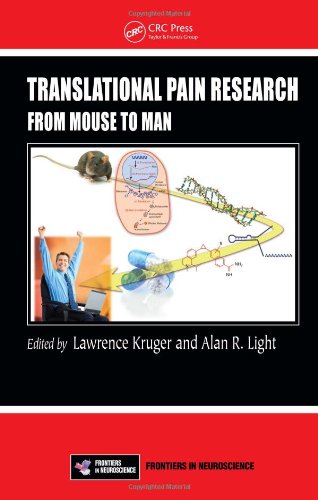
Translational Pain Research: From Mouse to Man
by Lawrence Kruger, Alan R. Light
Publisher: CRC Press 2010
ISBN/ASIN: 1439812098
ISBN-13: 9781439812099
Number of pages: 432
Description:
Bringing together recent advances in modern neuroscience regarding genetic studies in mice and humans and the practicality of clinical trials, this volume effectively bridges the gap between basic research and patient care by humanely examining rodent models for pain associated with bone cancer, osteoarthritis, fibromyalgia, and cardiac episodes.
Download or read it online for free here:
Read online
(online html)
Similar books
 On the Origin of the Human Mind
On the Origin of the Human Mindby Andrey Vyshedskiy - MobileReference
The origin of the human mind remains one of the greatest mysteries of all times. The author offers an elegant, parsimonious theory of the evolution of the human mind and suggests experiments that could be done to refute or validate the hypothesis.
(12278 views)
 The Neurobiology of Olfaction
The Neurobiology of Olfactionby Anna Menini - CRC Press
The book provides a thorough analysis of the state-of-the-science in olfactory knowledge. Authors explore various aspects of olfaction, including genetics, behavior, olfactory systems, odorant receptors, odor coding, and cortical activity.
(10229 views)
 Dynamics of Cyclic Nucleotide Signaling in Neurons
Dynamics of Cyclic Nucleotide Signaling in Neuronsby Nicholas C Spitzer, Pierre Vincent (eds) - Frontiers Media SA
Cyclic nucleotides control a number of neuronal properties including neuronal differentiation, pathfinding, regulation of excitability and synaptic transmission, and control of gene expression. Signaling events mediated by cAMP or cGMP are transient.
(7434 views)
 Spiking Neuron Models: Single Neurons, Populations, Plasticity
Spiking Neuron Models: Single Neurons, Populations, Plasticityby Wulfram Gerstner, Werner M. Kistler - Cambridge University Press
This introduction to spiking neurons can be used in advanced-level courses in computational neuroscience, theoretical biology, neural modeling, biophysics, or neural networks. It focuses on phenomenological approaches rather than detailed models.
(9889 views)